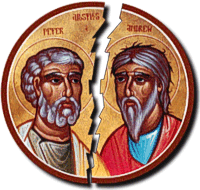I feel like I learned this...ages ago...as a sophomore in AP European history...but it's all a blur. Things I learned/re-learned:
- The Orthodox church and the Roman Catholic church were once the same
- Orthodox means "same" and Catholic means "universal"--both claiming to be the real church of Christ
- Constantine becoming Christian and moving the capital from Rome to Constantinople was one of the things that lead to the split of the churches
- The Orthodox Church has its capital in Constantinople/Istanbul
- The Roman Catholic Church has its capital in, well, Rome!
- They differed over the Nicean creed: the Orthodox church kept the wording the same, that the Holy Spirit proceeds forth from the Father; the Catholics changed it be be "Father and the Son." This made Christ seem to be equal to the Father, which the Orthodox didn't like, considering Christ to be a "creature" of the Father.
- Most significantly, they differed on the nature of Christ, whether he was mostly God or mostly human
- After this, the bishop of Rome said that he could trace his apostolic lineage back to Peter and Paul, giving him more precedence. This lead to the bishop of Rome being called the "Pope." Gradually the Pope was considered to be the ultimate authority. An edict was announced that when the Pope is speaking on religious or moral issues, he is infallible. Of course, the Orthodox Church could not accept this.
- I somehow thought that the Pope had existed since the beginning of the Catholic church, so it was interesting to me that they arose from the bishops, and that they weren't always considered the highest authority.
- After the spread of the Islamic empire, the Patriarch of the Orthodox Church asked the Roman Catholic Church to come help them--thus the Crusades began as an effort to save them! ...but it ended a few centuries later with the Roman Catholic crusaders pillaging Constantinople...
- After nearly a thousand years of each church "excommunicating" the other, they reversed that decision in the 1900s. (1946?)
- There is an effort to join both churches again (I had no idea), and that may begin with doing the Eucharist the same way. However, some think that the churches differ so much that that is no longer possible. But there's an ideal of having one unified church.
This is what I remember from the documentary. Now, I could have remembered some things wrong, or the DVD could have been wrong in the first place. If you know more about this, please set the story straight! :)



No comments:
Post a Comment